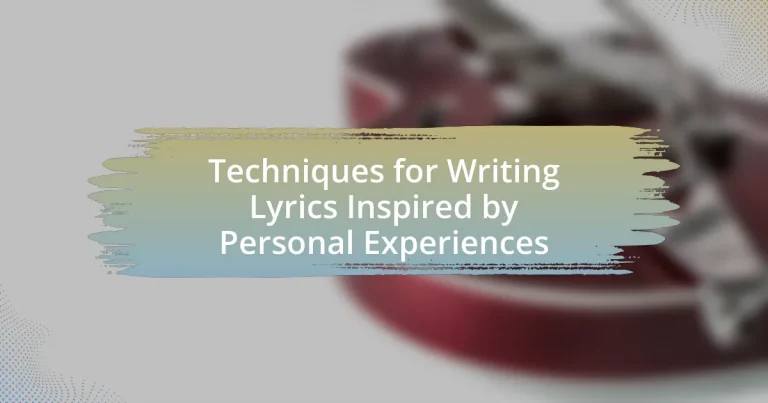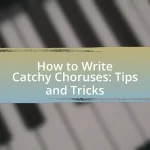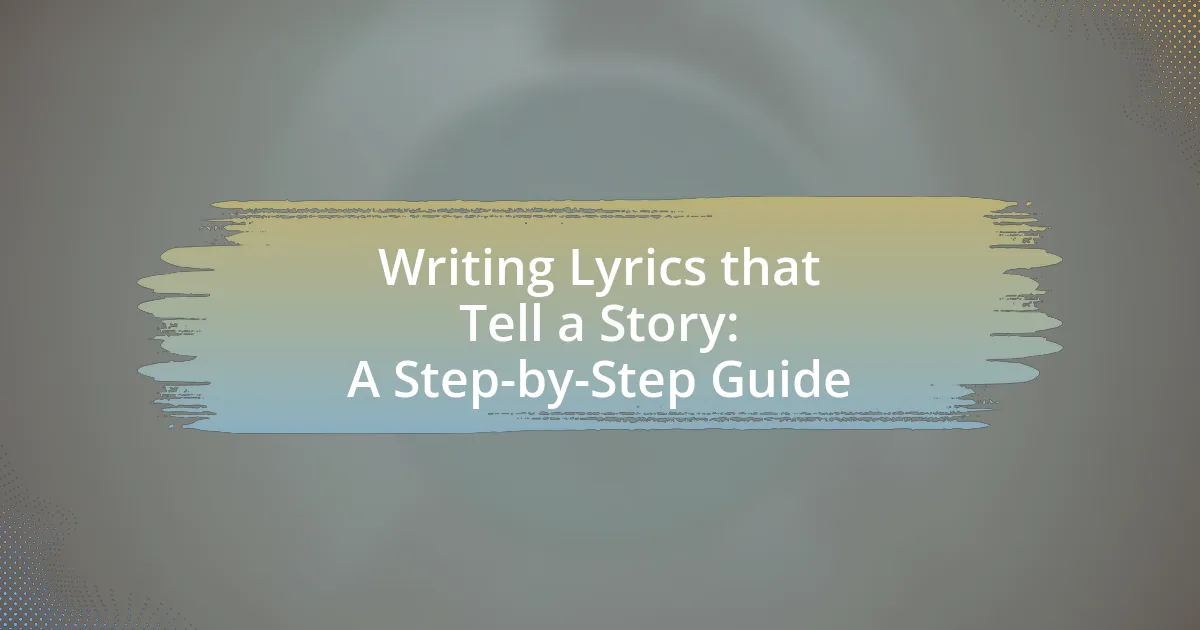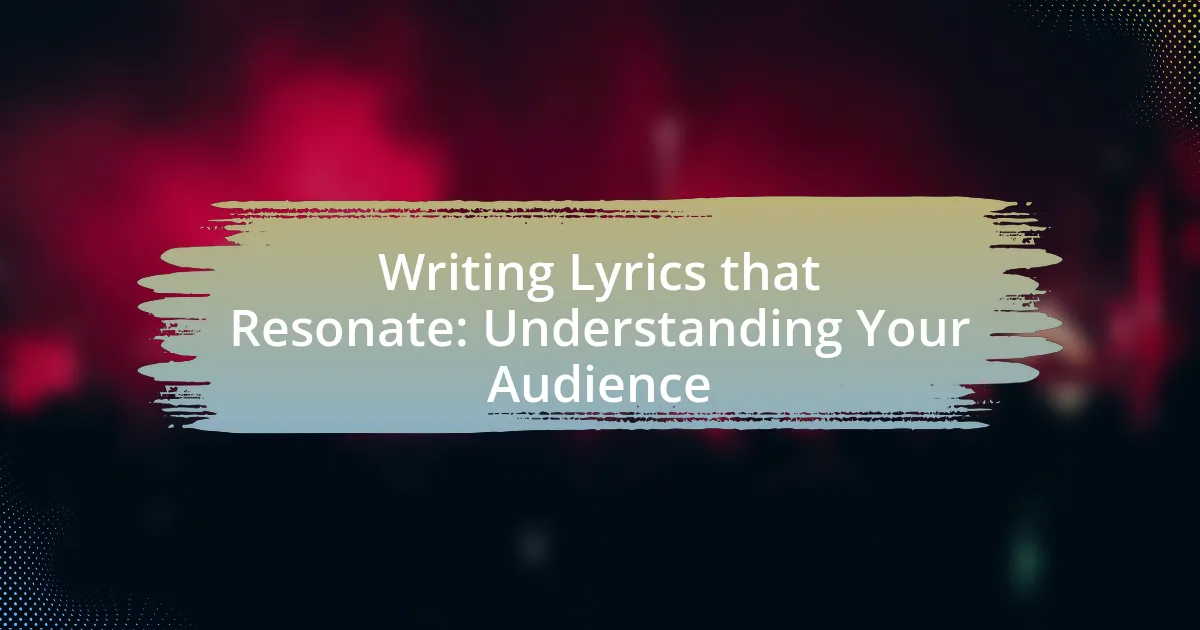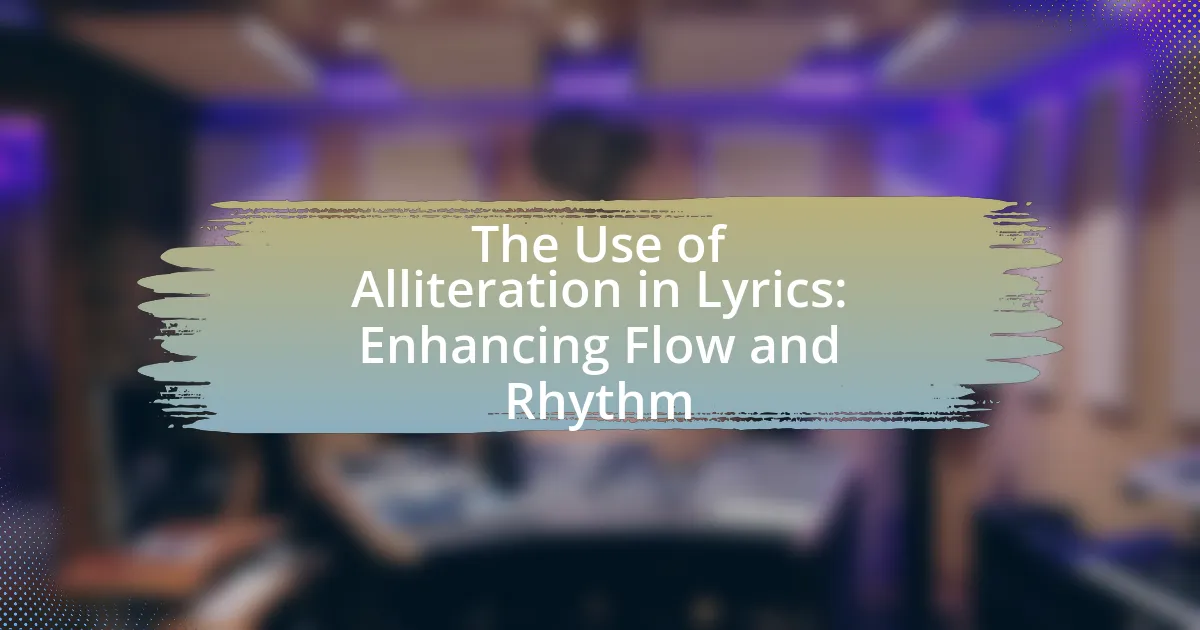The article focuses on techniques for writing lyrics inspired by personal experiences, emphasizing methods such as journaling, vivid imagery, and storytelling. It explores how personal experiences shape lyrical content, highlighting the importance of authenticity and emotional resonance in creating relatable narratives. The article also discusses effective emotional experiences for lyric writing, the role of introspection and specificity in refining lyrics, and best practices for maintaining a balance between personal and universal themes. Additionally, it addresses common pitfalls in the editing process and offers strategies for overcoming writer’s block.
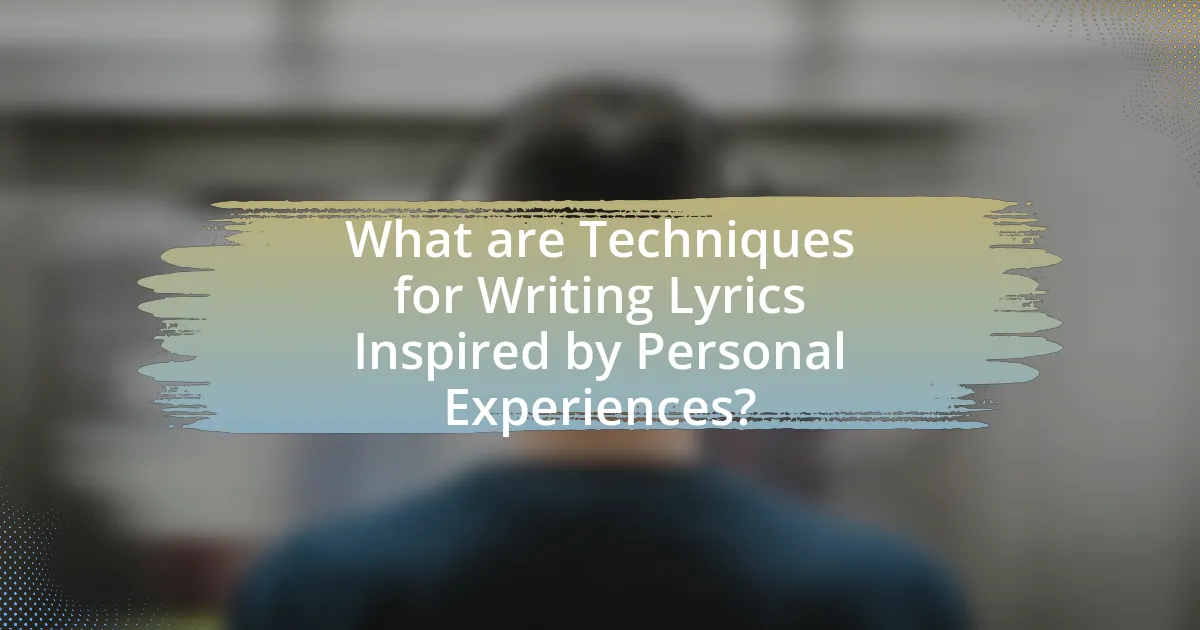
What are Techniques for Writing Lyrics Inspired by Personal Experiences?
Techniques for writing lyrics inspired by personal experiences include journaling, using vivid imagery, and employing storytelling. Journaling allows songwriters to capture raw emotions and thoughts, which can later be transformed into lyrics. Utilizing vivid imagery helps convey feelings and settings, making the lyrics relatable and impactful. Storytelling techniques, such as creating a narrative arc, can engage listeners by presenting personal experiences in a structured and compelling way. These methods are effective because they draw from authentic emotions and experiences, enhancing the connection between the songwriter and the audience.
How can personal experiences shape the writing of lyrics?
Personal experiences significantly shape the writing of lyrics by providing authentic emotions and relatable narratives. When songwriters draw from their own life events, they create a deeper connection with listeners, as these experiences often resonate on a universal level. For instance, artists like Taylor Swift and Ed Sheeran have built their careers on autobiographical songwriting, which allows them to convey genuine feelings and stories that reflect their personal journeys. This approach not only enhances the emotional impact of the lyrics but also fosters a sense of intimacy between the artist and the audience, making the music more compelling and memorable.
What types of personal experiences are most effective for lyric writing?
Emotional experiences are the most effective for lyric writing. These include love, heartbreak, loss, and personal struggles, as they resonate deeply with listeners. For instance, a study by the University of Southern California found that songs expressing genuine emotions, particularly those related to personal pain or joy, tend to achieve higher listener engagement and connection. This connection is crucial, as it allows the audience to relate to the lyrics on a personal level, enhancing the overall impact of the song.
How do emotions influence the lyrical writing process?
Emotions significantly influence the lyrical writing process by shaping the themes, tone, and authenticity of the lyrics. When songwriters draw from their emotional experiences, they create more relatable and impactful content, as emotions serve as a catalyst for creativity and expression. Research indicates that emotional experiences can enhance memory retention and detail recall, which are crucial for crafting vivid imagery in lyrics. For instance, a study published in the journal “Psychological Science” by authors such as J. M. A. M. van der Meer and colleagues found that emotional arousal can lead to more detailed and vivid memories, which songwriters can translate into compelling lyrics. Thus, emotions not only guide the lyrical content but also enrich the storytelling aspect, making the music resonate more deeply with listeners.
Why is authenticity important in writing lyrics from personal experiences?
Authenticity is crucial in writing lyrics from personal experiences because it fosters a genuine connection between the artist and the audience. When lyrics reflect true emotions and experiences, listeners can relate more deeply, enhancing their emotional engagement with the music. Research indicates that songs based on authentic experiences resonate more with audiences, leading to increased popularity and listener loyalty. For instance, a study published in the Journal of Popular Music Studies found that songs perceived as authentic received higher ratings from listeners, demonstrating the impact of authenticity on audience reception.
How does authenticity resonate with listeners?
Authenticity resonates with listeners by fostering a genuine emotional connection that enhances relatability. When artists express their true selves and share personal experiences, listeners often feel understood and validated, which can lead to a deeper engagement with the music. Research indicates that songs perceived as authentic can increase listener enjoyment and emotional response, as demonstrated in a study published in the Journal of Personality and Social Psychology, where participants rated songs higher when they believed the artist was being sincere. This connection is crucial in the context of writing lyrics inspired by personal experiences, as it allows artists to create impactful narratives that resonate on a personal level with their audience.
What are the risks of inauthenticity in lyric writing?
The risks of inauthenticity in lyric writing include alienating the audience, damaging the artist’s credibility, and limiting emotional connection. When lyrics lack genuine personal experience, listeners may perceive them as insincere, leading to disengagement. Research indicates that authenticity in music correlates with listener satisfaction; for instance, a study published in the Journal of Popular Music Studies found that audiences favor artists who convey real emotions and experiences. Additionally, artists who consistently produce inauthentic content may face backlash, resulting in a decline in their fan base and opportunities. Thus, maintaining authenticity is crucial for sustaining a meaningful connection with listeners and preserving an artist’s reputation.
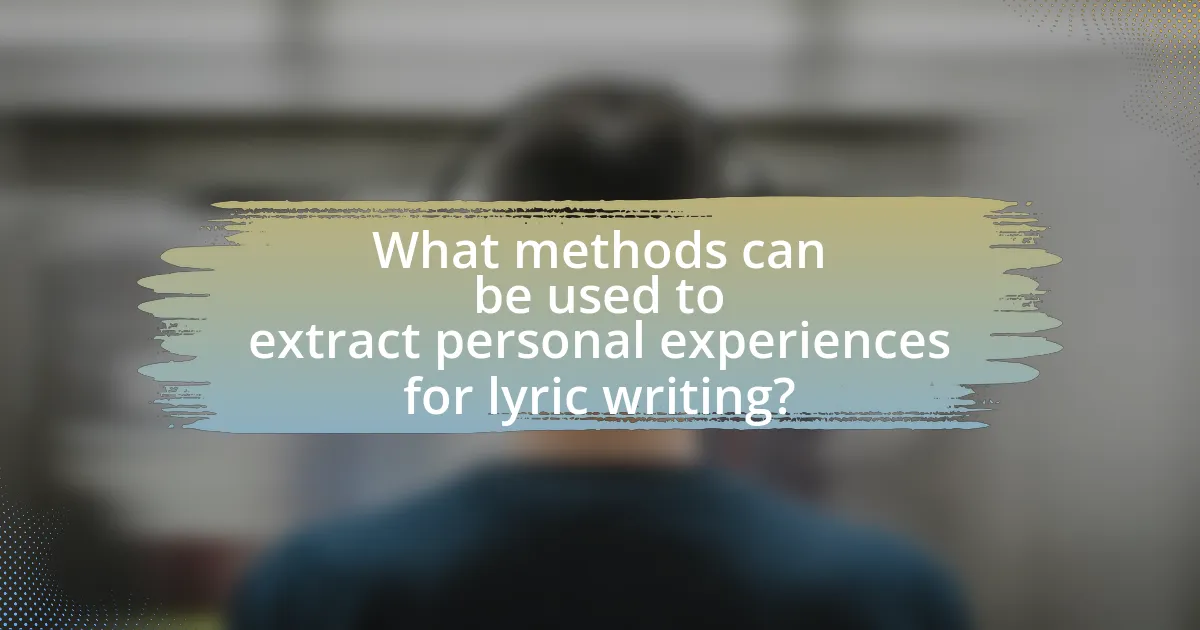
What methods can be used to extract personal experiences for lyric writing?
Methods to extract personal experiences for lyric writing include journaling, free writing, and reflective questioning. Journaling allows individuals to document daily thoughts and emotions, providing a rich source of material for lyrics. Free writing encourages spontaneous expression without self-censorship, often revealing deeper feelings and memories that can inspire song themes. Reflective questioning involves asking oneself about significant life events, emotions, and relationships, which can lead to insights that translate into compelling lyrics. These methods are effective as they promote self-exploration and emotional honesty, essential elements in creating relatable and impactful music.
How can journaling aid in the lyric writing process?
Journaling can significantly aid in the lyric writing process by providing a structured outlet for personal thoughts and emotions. This practice allows songwriters to capture raw feelings and experiences, which can later be transformed into lyrical content. Research indicates that expressive writing, such as journaling, enhances creativity and emotional clarity, making it easier to articulate complex emotions in song lyrics. For instance, a study published in the Journal of Creative Behavior found that individuals who engage in regular journaling report increased creative output and improved emotional processing, both of which are essential for effective lyric writing.
What techniques can be used in journaling to enhance creativity?
Techniques that can be used in journaling to enhance creativity include free writing, mind mapping, and prompt-based journaling. Free writing encourages the flow of thoughts without self-censorship, allowing ideas to emerge organically, which has been shown to stimulate creative thinking. Mind mapping visually organizes thoughts and connections, fostering a broader perspective on ideas, as supported by research indicating that visual aids enhance cognitive processing. Prompt-based journaling provides specific themes or questions that can spark inspiration and lead to deeper exploration of personal experiences, effectively guiding the writer’s creativity.
How often should one journal to maintain a flow of ideas?
To maintain a flow of ideas, one should journal daily. Regular daily journaling encourages consistent idea generation and reflection, which enhances creativity. Research indicates that daily writing can improve cognitive function and emotional clarity, thereby facilitating a continuous stream of thoughts and concepts.
What role does storytelling play in writing lyrics from personal experiences?
Storytelling is essential in writing lyrics from personal experiences as it transforms emotions and events into relatable narratives. By weaving personal anecdotes into a structured story, songwriters can evoke empathy and connection with listeners, making their experiences resonate on a deeper level. Research indicates that songs with narrative elements often engage audiences more effectively, as they create vivid imagery and emotional arcs that enhance the listener’s experience. For instance, artists like Taylor Swift and Bruce Springsteen utilize storytelling to convey complex feelings and situations, demonstrating that personal storytelling in lyrics can lead to greater emotional impact and listener engagement.
How can one structure a personal story into a song format?
To structure a personal story into a song format, one should begin by identifying the core theme or message of the story. This involves distilling the essence of the experience into a central idea that can be expressed through lyrics. Next, the songwriter should outline the song’s structure, typically consisting of verses, a chorus, and possibly a bridge. Each verse can narrate different aspects or moments of the personal story, while the chorus encapsulates the main emotional takeaway or hook.
For example, if the personal story revolves around overcoming adversity, the verses can detail specific challenges faced, and the chorus can express the triumph or lesson learned. This method aligns with common songwriting practices, where storytelling is a fundamental element, as seen in genres like folk and country music, which often draw heavily from personal narratives. By following this structured approach, songwriters can effectively translate their experiences into relatable and impactful songs.
What elements of storytelling are essential for impactful lyrics?
Essential elements of storytelling for impactful lyrics include character development, emotional resonance, and a clear narrative arc. Character development allows listeners to connect with the personas in the lyrics, making the story relatable and engaging. Emotional resonance evokes feelings that enhance the listener’s experience, often achieved through vivid imagery and personal anecdotes. A clear narrative arc provides structure, guiding the audience through the beginning, middle, and end of the story, which helps maintain interest and convey a message effectively. These elements are supported by the fact that songs with strong storytelling often resonate more deeply with audiences, as seen in the works of artists like Bob Dylan and Taylor Swift, who utilize these techniques to create memorable and impactful lyrics.
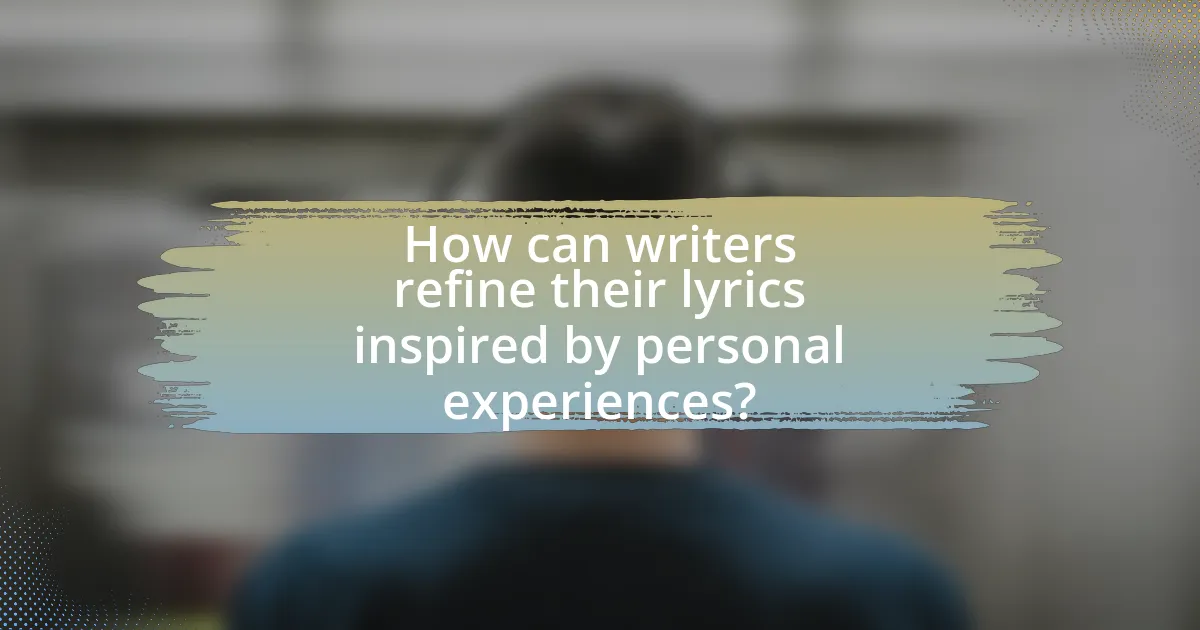
How can writers refine their lyrics inspired by personal experiences?
Writers can refine their lyrics inspired by personal experiences by employing techniques such as introspection, specificity, and emotional resonance. Introspection allows writers to delve deeply into their feelings and thoughts, ensuring that the lyrics authentically reflect their experiences. Specificity enhances the imagery and relatability of the lyrics, as concrete details make the emotions more vivid and impactful. Emotional resonance is crucial, as it connects the writer’s personal experiences to universal themes, allowing listeners to relate to the lyrics on a deeper level. These techniques are supported by studies in songwriting that emphasize the importance of personal authenticity and emotional connection in creating compelling lyrics.
What techniques can be used for editing and revising lyrics?
Techniques for editing and revising lyrics include line-by-line analysis, feedback from peers, and utilizing tools like rhyme dictionaries and thesauruses. Line-by-line analysis allows lyricists to scrutinize each line for clarity, emotional impact, and flow, ensuring that every word serves a purpose. Feedback from peers provides diverse perspectives, which can highlight areas for improvement that the original writer may overlook. Additionally, using rhyme dictionaries and thesauruses can enhance word choice and creativity, leading to more engaging and polished lyrics. These methods are widely recognized in songwriting communities and are essential for refining lyrical content.
How can feedback from others improve lyric quality?
Feedback from others can significantly improve lyric quality by providing diverse perspectives that highlight strengths and weaknesses in the writing. When songwriters receive constructive criticism, they can identify areas for improvement, such as clarity, emotional impact, and thematic coherence. For instance, a study published in the Journal of Creative Behavior found that collaborative feedback enhances creativity and leads to higher-quality artistic outputs. This evidence supports the idea that external input can refine lyrics, making them more relatable and impactful for audiences.
What common pitfalls should be avoided during the editing process?
Common pitfalls to avoid during the editing process include neglecting to take breaks, which can lead to a lack of perspective on the work. Editors often miss errors or inconsistencies when they are too close to the material. Additionally, failing to establish clear goals for the editing session can result in unfocused efforts, making it difficult to identify areas needing improvement. Over-editing is another significant pitfall; excessive changes can dilute the original voice and intent of the lyrics. Lastly, ignoring feedback from others can prevent valuable insights that enhance the quality of the work. These pitfalls can hinder the effectiveness of the editing process and ultimately impact the final product.
What are some best practices for writing lyrics based on personal experiences?
To write lyrics based on personal experiences effectively, focus on authenticity and emotional resonance. Authenticity ensures that the lyrics reflect genuine feelings and situations, which can create a deeper connection with listeners. Emotional resonance allows the audience to relate to the experiences shared, making the lyrics more impactful.
Additionally, using specific imagery and details can enhance the vividness of the lyrics, allowing listeners to visualize the experiences. For instance, instead of stating a general feeling of sadness, describing a specific moment that triggered that emotion can evoke stronger feelings.
Moreover, employing a structured approach, such as starting with a central theme or story, can help organize thoughts and maintain coherence throughout the song. This method aids in conveying the intended message clearly.
Lastly, revising and seeking feedback from trusted peers can refine the lyrics, ensuring they resonate well with the intended audience. These practices collectively contribute to crafting compelling and relatable lyrics rooted in personal experiences.
How can one maintain a balance between personal and universal themes?
To maintain a balance between personal and universal themes, one should weave personal experiences into broader narratives that resonate with a wider audience. This can be achieved by identifying core emotions or situations in personal stories that are relatable, such as love, loss, or triumph, and expressing them in a way that invites others to connect. For instance, a songwriter might draw from a specific heartbreak but frame it within the universal theme of longing, allowing listeners to see their own experiences reflected in the lyrics. This technique not only personalizes the content but also elevates it to a level where it speaks to shared human experiences, making the work more impactful and accessible.
What tips can help in overcoming writer’s block when drawing from personal experiences?
To overcome writer’s block when drawing from personal experiences, one effective tip is to engage in free writing, which involves writing continuously for a set period without worrying about grammar or structure. This technique allows thoughts and emotions to flow freely, often leading to unexpected insights and ideas. Research indicates that free writing can reduce anxiety and enhance creativity, making it easier to access personal memories and feelings. Additionally, creating a mind map of significant life events can help visualize connections and themes, providing a structured approach to explore personal narratives. This method has been shown to stimulate cognitive processes, facilitating the generation of lyrical content.
